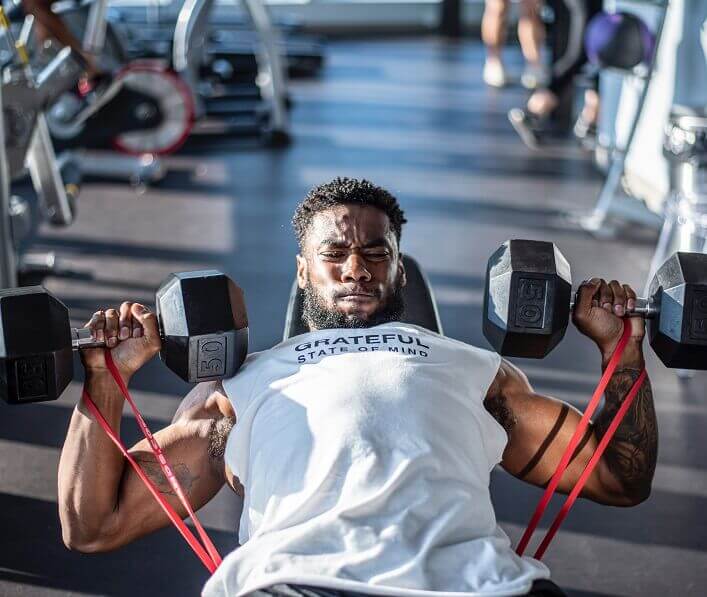6 mins read
Can Exercise Increase Your Testosterone Levels?
Author: Forth
August 31, 2017
General wellbeing

- Why is Testosterone Important?
- Types of Exercises That May Boost Testosterone
- The Impact of Resistance Training on Testosterone Levels
- Cardiovascular Exercise and Testosterone Production
- Dietary Factors That Can Support Testosterone Levels
- Lifestyle Habits That May Influence Testosterone Production
- The Importance of Rest and Recovery for Testosterone Levels
- What Causes Low Testosterone Levels in Men?
Testosterone is a hormone that is primarily associated with male sexual development and function, but it also plays a crucial role in other aspects of health, such as muscle mass, bone density, and mood regulation.
This article will explore the relationship between exercise and testosterone levels and discuss the types of exercises that may boost testosterone. We will also delve into the impact of resistance training and cardiovascular exercise on testosterone production, as well as the dietary factors and lifestyle habits that can support optimal testosterone levels.
Why is Testosterone Important?
Testosterone is an important hormone for men, playing an essential role in various bodily functions.
Primarily, it underpins the development of male sexual characteristics, including muscle mass, bone density, and the growth of body hair. Beyond its physical attributes, testosterone is crucial for overall well-being, influencing mood, energy levels, and libido.
It significantly contributes to muscle strength and endurance, enabling athletes to perform at their peak. It also aids in faster recovery from exercise-induced stress and injuries.
Types of Exercises That May Boost Testosterone
Research suggests that regular exercise may have a positive impact on testosterone levels.
Studies have shown that both aerobic and resistance training can stimulate testosterone production. However, the extent to which exercise can influence testosterone levels may vary depending on several factors, including your age, fitness level, and overall health.
While exercise can promote testosterone production, the effect may be temporary and short-lived.
The type and intensity of exercise can also play a role in its impact on testosterone levels.
High-intensity interval training (HIIT), for example, has been found to have a more significant effect on testosterone levels compared to moderate-intensity continuous training. This is thought to be due to the stress that HIIT places on the body, triggering a hormonal response that includes an increase in testosterone production.
Incorporating compound exercises that target multiple muscle groups, such as squats, deadlifts, and bench presses, into your workout routine can further support testosterone production. These compound movements not only help build strength and muscle mass but also have been shown to elicit a greater hormonal response compared to isolation exercises.
The Impact of Resistance Training on Testosterone Levels
Resistance training, commonly known as weightlifting or strength training, has long been recognised for its ability to promote muscle growth and strength. It can also have a significant impact on testosterone levels.
When you engage in resistance training, your muscles experience microscopic damage that triggers the release of testosterone in your body. Over time, this increased testosterone production can lead to improved muscle mass and strength. The intensity and duration of your workouts can influence the extent to which resistance training affects testosterone levels.
Studies have shown that resistance training not only affects testosterone levels in men but can also have a positive impact on women. While women typically have lower testosterone levels than men, the hormone still plays a crucial role in muscle growth and overall health.
The benefits of resistance training extend beyond just muscle growth and testosterone levels. It can also enhance bone density, improve joint stability, and boost metabolism. The combination of these factors makes resistance training a valuable component of any fitness routine, regardless of gender or age.
Cardiovascular Exercise and Testosterone Production
Cardiovascular exercise, often referred to as “cardio,” is any type of activity that raises your heart rate and improves the efficiency of your cardiovascular system.
While resistance training can be highly effective in boosting testosterone levels, cardiovascular exercise should not be overlooked. Studies have shown that regular cardiovascular exercise, such as running, swimming, or cycling, can also contribute to increased testosterone production.
However, it is important to note that the impact of cardio exercises on testosterone levels may not be as significant as that of resistance training. Nevertheless, incorporating cardiovascular exercise into your fitness routine can provide a range of other health benefits, such as improved cardiovascular function and weight management.
Endurance exercises, such as long-distance running, have been found to temporarily decrease testosterone levels.
Dietary Factors That Can Support Testosterone Levels
Alongside exercise, certain dietary factors can help support optimal testosterone levels.
Adequate protein intake is essential, as protein provides the building blocks for testosterone production.
Foods rich in zinc and healthy fats can aid in testosterone production.
Vitamin D also plays an important role in various bodily functions, including hormone regulation. We found that 68% of adults in the UK have vitamin D levels outside the healthy range.
Antioxidants help combat oxidative stress in the body, which can otherwise negatively impact hormone production. Berries, dark chocolate, and leafy green vegetables are excellent sources of antioxidants that can contribute to overall hormonal balance and well-being.
Lifestyle Habits That May Influence Testosterone Production
Various lifestyle habits can also impact testosterone production.
Stress management is crucial, as chronic stress can disrupt hormone balance and reduce testosterone levels.
Getting enough sleep is equally important, as testosterone is primarily produced during sleep. Poor sleep habits, such as insufficient or disrupted sleep, can lead to decreased testosterone levels.
Maintaining a healthy body weight is another lifestyle factor that can influence testosterone production. Obesity has been linked to lower testosterone levels, so maintaining a healthy weight through a balanced diet and regular exercise is essential.
It’s also estimated that 40% of type 2 diabetics are testosterone deficient.
The Importance of Rest and Recovery for Testosterone Levels
While exercise is important for testosterone production, it is equally crucial to prioritise rest and recovery.
When the body is constantly under stress from intense physical activity without adequate rest, it can enter a state of chronic stress, leading to elevated levels of cortisol – a hormone that can inhibit testosterone production.
Giving your body enough time to recover between workouts allows for proper muscle repair and growth, which can subsequently lead to increased testosterone production.
When the body is constantly under stress from intense physical activity without adequate rest, it can enter a state of chronic stress, leading to elevated levels of cortisol – a hormone that can inhibit testosterone production.
Jamie, Forth’s SEO Manager, explains his experience with overtraining:
“I joined my local gym in January 2020. It was the first time I’d ever stepped foot in a gym so I wasn’t too sure what I should be doing. YouTube became my go-to source of information on how to build muscle and get fit. The “influencers” said the best way to grow muscle is to hit every muscle group twice a week.
So, that’s what I did. I went to the gym for 1-2 hours 6 days a week.
I did get stronger. But only to a certain point. After about a year I spent months plateauing. I wasn’t lifting any heavier or getting bigger.
It wasn’t until I checked my testosterone levels and spoke to a coach that I found my levels were low and that it was most likely the cause of my problems.
I’ve since reduced my gym days to a maximum of 4, with more cardio, too. My testosterone levels have risen from 14.9 nmol/L to 21.1 nmol/L – dead centre of my healthy range.
There has been a positive impact on my performance – I’m lifting heavier and feel healthier, too.”
What Causes Low Testosterone Levels in Men?
Low testosterone levels, also known as hypogonadism, can have various causes.
Age is a significant factor, as testosterone production naturally declines with age.
Certain medical conditions, such as obesity, diabetes, and hormonal disorders, can also contribute to low testosterone levels. Lifestyle factors, such as poor dietary choices, sedentary behaviour (lack of exercise), and chronic stress, can further exacerbate the problem.
If you suspect that you have low testosterone levels, an at-home blood test for male hormones
- Health scores calculated
Close
Related articles
Like this article? Here are some more based on similar topics.





